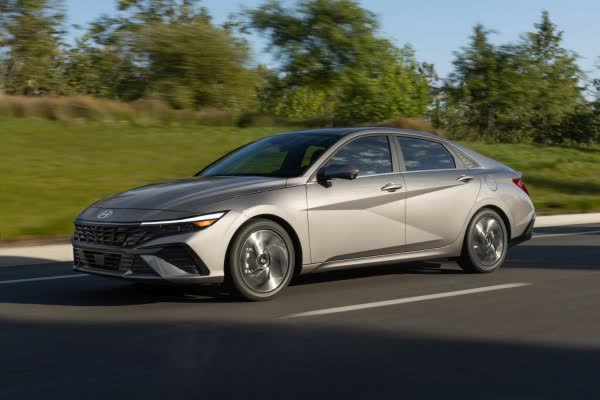Everything you need to know about specifications and performance - Hyundai Elantra 2023 - 2.0 MPI (147 Hp) IVT

Overview:
What is the engine capacity of a Hyundai Elantra 2023?
The engine capacity of the Hyundai Elantra 2023 is 1999.
Hyundai Elantra 2023 How many horsepower?
The engine power of the Hyundai Elantra 2023 is 147 Hp @ 6200 rpm..
What is the Hyundai Elantra 2023 engine?
Hyundai Elantra 2023 engine is Smartstream / G4NS. (Click to see other cars using the same engine)
How much gasoline does a Hyundai Elantra 2023 consume?
The Hyundai Elantra 2023 consumes 6.9 liters of gasoline per 100 km
General:
Brand: Hyundai
Model: Elantra
Generation: VII (CN7, facelift 2023)
Modification (Engine): 2.0 MPI (147 Hp) IVT
Start of production: August, 2023
End of production:
Powertrain Architecture: Internal Combustion Engine
Body type:Sedan
Seats: 5
Doors: 4
Engine:
Engine systems: Start & Stop System
Power: 147 hp @ 6200 rpm.
Power per litre: 73.5 hp/l
Torque: 179 nm @ 4500 rpm.
Engine Model/Code:Smartstream / G4NS
Engine displacement: 1999
Number of cylinders: 4
Engine configuration: Inline
Number of valves per cylinder: 4
Fuel injection system: Multi-port manifold injection
Engine aspiration: Naturally aspirated Engine
Valvetrain: DOHC, D-CVVT
Engine oil capacity: 4.3 l
Coolant: 7.4 l
Engine layout: Front, Transverse
Cylinder Bore: 81 mm
Piston Stroke: 97 mm
Compression ratio: 12.5:1
Performance:
Fuel Type: Petrol (Gasoline)
Fuel consumption (economy) - urban: 7.6 l/100 km
Fuel consumption (economy) - extra urban: 5.9 l/100 km
Fuel consumption (economy) - urban (EPA): 7.6 l/100 km
Fuel consumption (economy) - extra urban (EPA): 5.9 l/100 km
Fuel consumption (economy) - combined (EPA): 6.9 l/100 km
Fuel consumption (economy) - combined: 6.9 l/100 km
Emission standard: LEV3 ULEV70
Weight-to-power ratio: 8.4 kg/Hp, 118.9 Hp/tonne
Weight-to-torque ratio: 6.9 kg/Nm, 144.8 Nm/tonne
Space:
Kerb Weight (kg): 1236-1301
Max. weight (kg): 1750
Max load (kg): 449-514
Trunk (boot) space - minimum: 402 l
Fuel tank capacity: 47 l
dimensions:
Length: 4710 mm
Width: 1825 mm
Height: 1415 mm
wheelbase: 2720 mm
Front track: 1579-1593 mm
Rear (Back) track: 1590-1604 mm
Front overhang: 920 mm
Rear overhang: 1070 mm
Ride height (ground clearance): 135 mm
Minimum turning circle (turning diameter): 10.8 m
Powertrain, Suspension and Brakes:
Drivetrain Architecture: The Internal combustion Engine (ICE) drives the front wheels of the vehicle.
Drive wheel: Front wheel drive
Number of gears and type of gearbox: automatic transmission IVT
Front brakes: Ventilated discs, 280 mm
Rear brakes: Disc, 262 mm
Assisting systems: ABS (Anti-lock braking system)
Steering type: Steering rack and pinion
Power steering: Electric Steering
Tires size: 195/65 R15; 205/55 R16; 225/45 R17
Wheel rims size: 6J x 15; 6.5J x 16; 7J x 17
Front suspension: Independent, type McPherson with coil Spring and anti-roll bar
Rear suspension: Coil spring, Torsion
See also

Other generation.
Its production began in 2020 until 2023

Same engine. (Smartstream / G4NS).
Its production began in 2021 until 2023

Write a comment